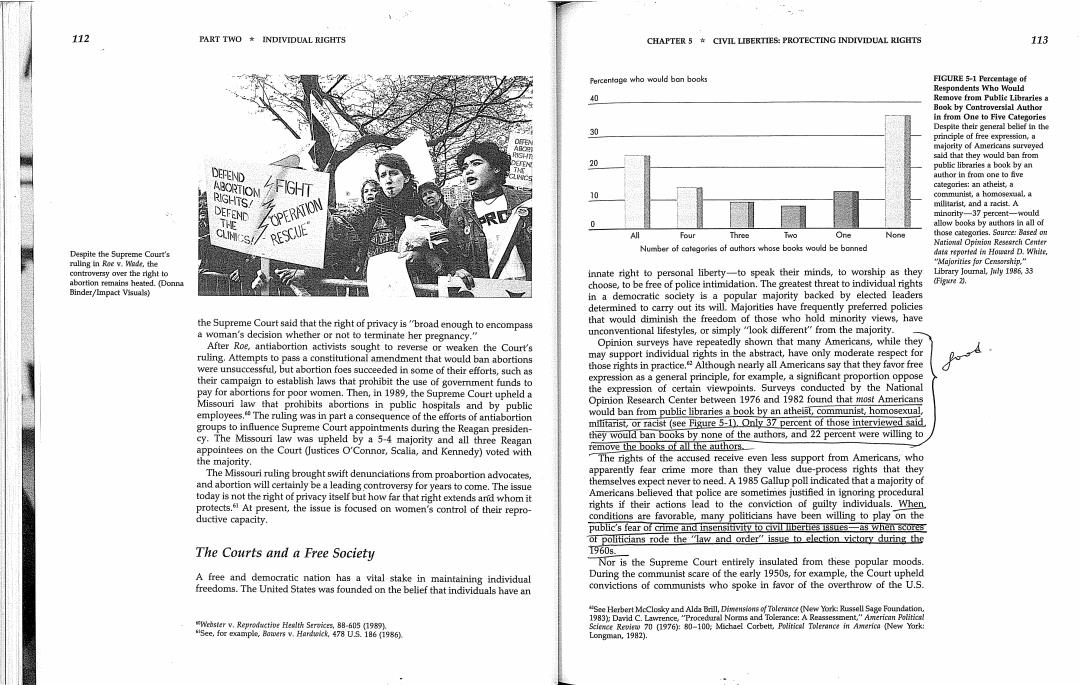正在加载图片...

112 PART TWO INDIVIDUAL RIGHTS CHAPTER 5 CIVIL LIBERTIES:PROTECTING INDIVIDUAL RIGHTS 113 Percentage who would bon books FICURE 5-1 Fereeatage of ndents Who Would Book by Controversial Author in from One to Five Categories 必 Desplte their general belsef in the principle of free expression,a said that they 20 book byan author in from to five A30RTO外 categories:an atheist,a RIGHTS/ 10 commtaniss,a homosexal,a milltarist,and a racist.A DEFEND minority-37 percent-would allow books by RESCUE A Three o One None Based ou Despite the Supreme Court's Number of categories of outhors whose books would be banned data reported in Howerd D.White, "Majoriries for Cemsorship," innate right to personal liberty- -to speak their minds,to worship as they Library Journal,Jly 1986,33 ed.(Don choose,to be free of police intimidation.The greatest threat to individual rights Fg¥. Binder/Impact Visuals) in a democratic society is a popular majority backed by elected leaders determined to carry out its will.Majorities have frequently preferred policies the Supreme Court said that the right of privacy is"broad enough to encompass that would diminish the freedom of those who hold minority views,have a woman's decision whether or not to terminate her pregnancy." unconventional lifestyles,or simply "look different"from the majority. After Roe,antiabortion activists sought to reverse or weaken the Court's Opinion surveys have repeatedly shown that many Americans,while they ruling.Attempts to pass a constitutional amendment that would ban abortions may support individual rights in the abstract,have only moderate respect for were unsuccessful,but abortion foes suoceeded in some of their efforts,such as those rights in practice.Although nearly all Americans say that they favor free their campaign to establish laws that prohibit the use of government funds to expression as a general principle,for example,a significant proportion oppose pay for abortions for poor women.Then,in 1989,the Supreme Court upheld a the expression of certain viewpoints.Surveys conducted by the National Missouri law that prohibits abortions in public hospitals and by public Opinion Research Center between 1976 and 1982 found that most Americans employees."The ruling was in part a consequence of the efforts of antiabortion would ban from public libraries a book by an atheist,communist,homosexual. groups to influence Supreme Court appointments during the Reagan presiden- militarist,or racist (see Figure 5-1)Only 37 percent of those interviewed said cy.The Missouri law was upheld by a 5-4 majority and all three Reagan they would ban books by none of the authors,and 22 percent were willing to appointees on the Court (Justices O'Connor,Scalia,and Kennedy)voted with remove the books of all fhe authors. the majority. The rights of the accused receive even less support from Americans,who The Missouri ruling brought swift denunciations from proabortion advocates apparently fear crime more than they value due-process rights that they and abortion will certainly be a leading controversy for years to come.The issue themselves expect never to need.A 1985 Gallup poll indicated that a majority of today is not the right of privacy itself but how far that right extends and whom it Americans believed that police are sometimes justified in ignoring procedural protects.At present,the issue is focused on women's control of their repro- rights if their actions lead to the conviction of guilty individuals.When ductive capacity. conditions are favorable,many politicians have been willing to play on the public's fear of crime and insensitivity to civil liberties issues-as when scores of politicians rode the "law and order"issue to election victory during the The Courts and a Free Society T960s. Nor is the Supreme Court entirely insulated from these popular moods A free and democratic nation has a vital stake in maintaining individual During the communist scare of the early 1950s,for example,the Court upheld freedoms.The United States was founded on the belief that individuals have an convictions of communists who spoke in favor of the overthrow of the U.S "See Herbert McCloeky and Alda Brill,Dimensions of Tolenance (New York:Russell Sage Foundation 1983):David C.Lawrence,"Procedural Norms and Tolerance:A Reassessment,"Americn Poiitics Science Revirw 70 (1976):80-100;Michael Corbett,Political Tolerance in America (New York: Longman,1982). :